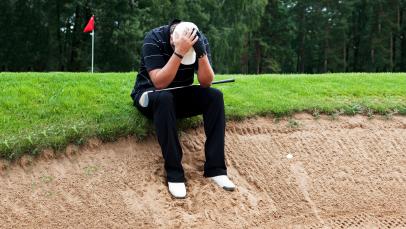Rules Review
Rules of Golf Review: Crazy s#!* that only happens in match play

Stephen Munday
With the Solheim Cup and Ryder Cup being held in back-to-back weeks, now is a good time to review the Rules of Golf and highlight some of the unique aspects that only apply to match play. Understanding these rules won’t just make watching these two team match-play events more enjoyable, but also will allow you to use them to your advantage the next time you’re playing in a match-play competition of your own—or at least will keep you from getting into some awkward situations with your opponent(s). Here are 10 to file away:
1. You can still putt after your next stroke has been conceded (Rule 23.6), but be careful before you do if you’re playing foursomes or four-ball. If any information from your putt would give your partner an advantage in playing his or her next stroke, your partner's score on that hole would not count.
2. If you find yourself in a four-ball match, and one of your opponents can't win the hole but can help his or her partner by continuing to play, you can concede the next stroke to prevent that opponent from assisting in the match (Rule 23.6).
3. If you're playing a match with handicap strokes, it's probably best to remind your opponent(s) before the round that those strokes also apply to holes in an extended match that goes beyond 18 (Rule 3.2c). And unless the Committee says differently, those holes should be played in the same order as the match.
4. If your partner is late for the tee time or has to skip a hole or holes for whatever reason, you can start or continue the match alone (Rule 23.4).
5. If your ball is on the green and its position can assist your opponent, it can be left in place (Rule 15.3a/2). In stroke play, you'd have to lift it if its position would help anyone.
6. Unless it's obvious to you, your opponent/s are required to tell you they got a penalty before you make another stroke. Failure to declare a penalty results in loss of hole (Rule 3.2d).
7. If you're uncertain how to proceed in a match, you're not allowed to play two balls to finish the hole (Rule 20.1b(4)). The two-ball procedure only applies in stroke play. Instead, you either have to agree with your opponent/s on how to proceed or request a ruling from a referee. That ruling needs to come before the match is final or if, there is no referee handy, you immediately tell your opponent/s that you intend to get a ruling on the issue after the round.
8. On a day where you were planning to play a four-ball match and someone can't make it at the last minute, you could switch to a three-ball match to make things more equitable. In three-ball, you play individual matches against the other two golfers congruently (Definitions: match play).
9. It's OK to practice on the course before the match (Rule 5.2a and 5.5b). You might get a few suspicious looks, but trying to figure out the break on the 18th hole, or any hole for that matter, before your competition begins is permissible unless the Committee deems otherwise.
10. Say you're playing against someone and you're assigned a caddie who will "double bag" for your match. The caddie can give advice to both of you. (So make sure you let it be known early how much you plan to tip!)







